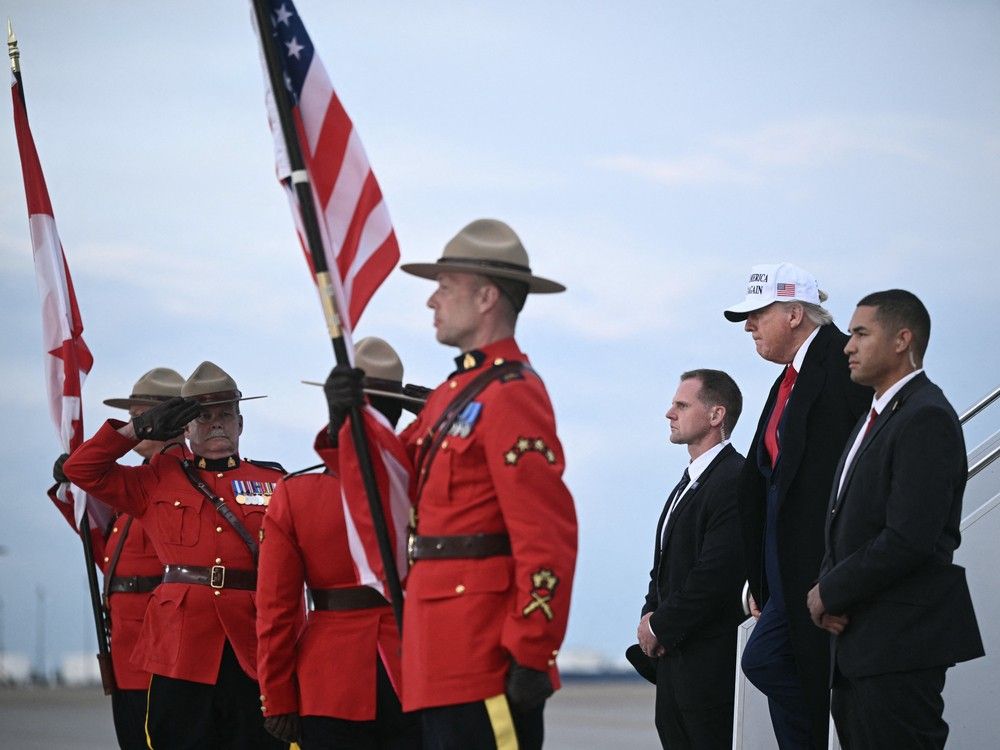
BANFF, ALTA. — U.S. President Donald Trump, following his meeting with Prime Minister Mark Carney, said that he feels a trade deal with Canada could be achievable shortly, while adding that he strongly objects to the ejection of Russia from what was then the G8 and supports the addition of China to the summit.
“I think we have different concepts,” said Trump on trade with Canada. “I have a tariff concept. Mark (Carney) has a different concept, which is something that some people like. But we’re going to see if we can get to the bottom of it today.”
The heads of the world’s seven most powerful economies are meeting amid a U.S.-led tariff war and global uncertainty over conflicts in the Middle East and Ukraine. In remarks made before the media on Monday morning, Carney wished Trump a belated happy birthday, which was Saturday. Trump also told reporters that he believes China, the world’s second largest economy, should join the leaders of the seven most advanced economies in the world.
“Well, it’s not a bad idea. I don’t mind that,” said Trump. “If somebody wants to suggest China coming in, I think we — but you want to have people that you can talk to.”
Trump also criticized the decision to eject Russia from the G8 in 2014, following that country’s annexation of Crimea, and said that Vladimir Putin “was very insulted” by the decision.
“The G7 used to be the G8. Barack Obama and a person named Trudeau didn’t want to have Russia in, and I would say that that was a mistake, because I think you wouldn’t have a war right now if you had Russia in, and you wouldn’t have a war right now if Trump were president four years ago,” Trump said. “It was a mistake in that you spend so much time talking about Russia, and he’s no longer at the table, so it makes life more complicated, but you wouldn’t have had the war.”
In fact, Russia’s membership in the G8 was suspended in March 2014. While Obama was the American president at the time, Conservative Stephen Harper was Canada’s prime minister. Months later, Harper made international headlines at the Group of 20 Summit in Australia when he admonished Putin, then Russia’s president, to “get out of Ukraine.” However, while saying booting Russia from the G8 was a mistake, Trump stopped short of saying that Putin should be invited back.
“I’m not saying he should at this point, because too much water has gone over the dam, maybe. But it was a big mistake,” he said.
Monday morning’s meeting is the first since the two men met in Washington, D.C. in early May. Canada has been a major target of Trump’s trade and rhetorical belligerence. Although Trump has largely scaled back talk of annexing Canada, making its northern neighbour the 51st state, trade troubles remain top of mind for observers and Canadian diplomats. Canada will be pushing Trump this week on lowering the 50-per-cent tariffs placed on Canadian steel and aluminum and further tariffs on foreign vehicle imports.
Before flying to Canada on Sunday, Trump said, without providing any details, that he thinks “
we’ll have a few new trade deals
” to announce while at the G7.
“Our primary focus would be trade and trade with Canada, and I’m sure we can work something out,” Trump told reporters.
Carney told Trump that the G7 is “nothing without U.S. leadership and without your personal leadership.” Trump responded that he and Carney have developed a “very good relationship.”
Trump then took multiple other questions, about the Iran-Israel conflict and about U.S. Immigration and Customs Enforcement raids in American cities that have seen major street protests mobilized in response. Eventually, Carney stepped in, ending the questions, saying that the leaders had to get to other meetings.
The Trump factor generally is looming over the G7 meeting. In 2018 in Charlevoix, Que,. the defining image of the G7 summit that year was Trump sitting down, arms crossed, a look of curious disdain on his face, while Angela Merkel, then the German chancellor, leaned over a table towards him. That year, Trump refused to sign on to a joint declaration with the other countries and criticized then prime minister Justin Trudeau as “dishonest and weak” over his criticism of tariffs. For 2025, Canada ditched the plan to issue a joint communiqué at the end of the summit, avoiding an overt show of disunity.
With additional reporting from Christopher Nardi
Get more deep-dive National Post political coverage and analysis in your inbox with the Political Hack newsletter, where Ottawa bureau chief Stuart Thomson and political analyst Tasha Kheiriddin get at what’s really going on behind the scenes on Parliament Hill every Wednesday and Friday, exclusively for subscribers. Sign up here.
Our website is the place for the latest breaking news, exclusive scoops, longreads and provocative commentary. Please bookmark nationalpost.com and sign up for our daily newsletter, Posted, here.
